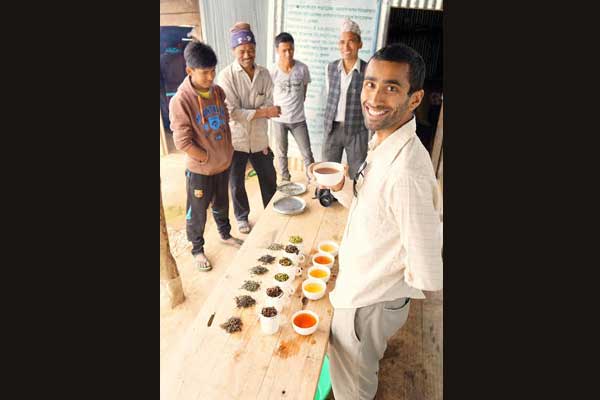
Tea beyond the cup
AdhirajVable started Young Mountain Tea in 2013 to take the idea of tea beyond the cup. The company, based in Oregon, USA, partnered with farmers in the Kumaon region in the foothills of the Himalayas to develop a new tea region. It buys teas from the Kumaon producers, exports them to the United States and then sells the products to local customers. Vable and his partner, Jeff Aspinall, whom he met at the University of Michigan as a freshman, and four other people make up the team.
“I was an electrical engineering major at the University of Michigan when I got interested in renewable energy,” says Vable. During a visit to his mother’s village, north of Bengaluru, Vable started working on a renewable energy project. “We managed to power a school with solar,” he says. This led to more solar projects.
When Vable travelled to Uttarakhand, he wanted to continue working with rural communities, but not in the area of renewable energy. “I have always been an avid tea drinker,” he says. “These mountain communities were traditionally agriculturists. So, I wondered if tea could be an option to explore in terms of sustainable livelihoods.”
Laying new ground
Vable’s work with the Uttarakhand-based nonprofit organization Avani, which creates livelihoods for rural communities in Kumaon, helped lay the foundation of Young Mountain Tea. In 2013, when he returned to Uttarakhand on a Fulbright-Nehru fellowship, Vable struck a deal with Avani. If Avani would work with the communities in and around Kumaon to grow tea, he would set up a company in the United States to sell it.
“The area has a very rich history of tea growth,” says Vable, adding that the villagers were already growing different types of low-quality tea that were exported to Russia. These teas weren’t pushed for high-quality processing. “All the caffeinated teas like green, white and black are part of the same plant, just grown and processed differently,” he says. Tea, as a crop, isn’t land-intensive. It’s also a fairly low-volume, high-profit-margin investment, which makes it a sustainable option for the communities involved. “Also, it’s not something the monkeys will eat,” laughs Vable. “That’s a huge issue in the area.”
Convincing the local partners to produce high-quality tea could have been difficult, but “unlike others who did one internship or volunteer experience and never came back, I kept going back,” says Vable. “I worked with them for seven years. So, when we spoke about tea, we already had a long-standing relation of trust.”
Tea takes about three years to reach the stage when it can be harvested. “We wrote to a nonprofit for a small grant and set the ground for cultivation,” says Vable. “We reached out to pioneers in the tea industry in India to be our mentors.” Young Mountain Tea sold the mentors’ teas in the United States as its own tea was being grown. “We learn from our mentors, adopt new ways and hope to bring an alternative method of tea production to India,” he says.
Besides outstanding quality, Young Mountain Tea says its teas are grown ethically.
Through his start-up, Vable also works to create dignified livelihoods for the remote mountain communities in the Kumaon region. The company helps make the mountain ecosystems stronger by supporting organic permaculture that intercrops tea with other mountain crops to restore biodiversity, strengthen native soils and prevent landslides.
Fostering cultural ties
“We named our company after the rising Himalayas, a mountain range that is still going up as the Indian subcontinent pushes into Asia,” says Vable. “The mission of our organization is to foster cross-cultural exchange, connecting remote communities in India to the U.S.”
Young Mountain Tea brings people interested in learning more about these villages of India to live and work in the Kumaon area. “We stay with local families, try and understand their daily routines and work in the fields with them,” he says.
New production models
Vable is confident of creating a niche in the crowded tea space in the United States. “Tea [quality] depends on how and where it’s grown,” he says. “Most tea companies go into tea gardens and buy what they have to offer. We have a relation with those who grow our tea. For us, improving the taste and quality of tea is an ongoing process. In that sense, no one can replicate our teas.”
(Courtesy SPAN)
Support Our Journalism
We cannot do without you.. your contribution supports unbiased journalism
IBNS is not driven by any ism- not wokeism, not racism, not skewed secularism, not hyper right-wing or left liberal ideals, nor by any hardline religious beliefs or hyper nationalism. We want to serve you good old objective news, as they are. We do not judge or preach. We let people decide for themselves. We only try to present factual and well-sourced news.







